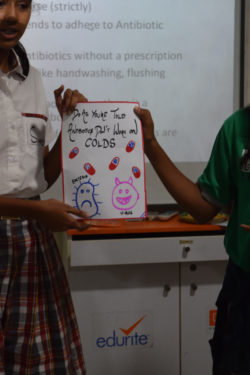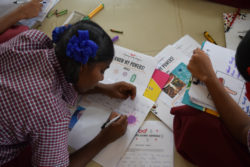Project details: Superheroes against Superbugs
Aims
To create a platform to initiate conversations and public action to tackle antibiotic resistance (ABR) in India
To empower young children with knowledge on ABR and partner with them in raising awareness about it's perils
To encourage scientists and medical professionals to engage with the society at large on ABR, science and health
For the pilot we partnered with school children in India in raising awareness on ABR by:
Equipping them with knowledge on ABR through create and fun hands-on activities
Providing a platform for their interaction with different stakeholders such as scientists and doctors, pharmacists and parents
Making the issue of ABR relatable to them by soliciting their own experiences
Equipping them with the tools to narrate their own stories around the issue through grass roots comics and other creative media.
Methods
 Superheroes against Superbugs combines innovative science education with public engagement approaches (on the lines of child-child approach) to empower young children with scientific knowledge on Antibiotic resistance (ABR), and equipping them with tools to use this knowledge to promote awareness and action in their sphere of influence.
Superheroes against Superbugs combines innovative science education with public engagement approaches (on the lines of child-child approach) to empower young children with scientific knowledge on Antibiotic resistance (ABR), and equipping them with tools to use this knowledge to promote awareness and action in their sphere of influence.
The pilot included two workshops of three days each at a government and a private school in the city of Hyderabad, India. 30 children from each school participated in interactive, hands on activities around microbes, infections, antibiotics designed to convey the complex topic of ABR in a fun and interesting manner. The program targeted 13-14 year old children, an age at which they can understand the scientific and health complexities of ABR and contribute towards spreading awareness. The activities were designed to use inexpensive and locally sourced material for ease of reproduction and scaling up.
The program also provided a platform for the young participants to initiate a dialogue with other stakeholders such as scientists, medical doctors, parents and pharmacists. ‘Ask a scientist’ session included interactions with various scientists working in the field of virology, immunology, microbiology and tuberculosis, while the ‘Meet the doctor’ session gave them an opportunity to engage with a paediatrician on health, hygiene, nutrition, preventing infections and misuse of antibiotics based on their own history of antibiotic usage. The homework was designed to solicit their own experiences through interactions with their parents on antibiotic usage in their households and with their local pharmacists to understand antibiotic dispensing practices in their neighbourhood.
Once armed with knowledge on the issue, the children were encouraged to explore different creative mediums to narrate stories and develop tools to initiate and sustain a dialogue on ABR.
 The program used Grassroots comics, a simple, cost effective and powerful engagement tool to enable the children to develop their own comics on different aspects of ABR including: health and hygiene, misuse and overuse of antibiotics, environmental issues surrounding ABR, misuse of antibiotics in animal farming and science of superbugs, while warning of its dangers. A particular advantage of grassroots comics is that they only require a pen and a paper and do not need the participants to be literate or possess any special artistic talent. The black and white comics are also easy to reproduce and exhibit. The children used these comics to further engage with their peers, teachers, parents and community. A sense of ownership of the comics ensured that the dialogue on ABR initiated during these sessions was sustained beyond the workshop.
The program used Grassroots comics, a simple, cost effective and powerful engagement tool to enable the children to develop their own comics on different aspects of ABR including: health and hygiene, misuse and overuse of antibiotics, environmental issues surrounding ABR, misuse of antibiotics in animal farming and science of superbugs, while warning of its dangers. A particular advantage of grassroots comics is that they only require a pen and a paper and do not need the participants to be literate or possess any special artistic talent. The black and white comics are also easy to reproduce and exhibit. The children used these comics to further engage with their peers, teachers, parents and community. A sense of ownership of the comics ensured that the dialogue on ABR initiated during these sessions was sustained beyond the workshop.
In addition to grassroots comics, participating children also developed posters, slogans, skits and animation film stories discussing the issue.
Based on the learnings from the pilot, the SaS team has helped organize awareness activities at school festivals and public events in different Indian cities.
